When Matthew Trevail joined GE Healthcare in 2018, he was comfortable with being a gay man. But his journey to self-acceptance wasn’t straightforward.
“I struggled with who I am for a while,” he says.
Trevail grew up in Cornwall, a rural part of the United Kingdom, and as a teen in the 1990s he found few LGBTQIA+ (lesbian, gay, bisexual, transgender, queer, intersex or asexual) role models with whom he could identify. “There were no family members or friends or people in the news or popular culture,” he says. “There were not a lot of out gay people in successful, visible or community roles.” At the time, the U.K. was battling the AIDS crisis: By 1995, 10,000 people in the U.K. had been diagnosed with AIDS and more than 25,000 were living with HIV, the virus that causes AIDS.[1] “Sadly, AIDS was still a factor and active in news stories, both on TV and in the newspapers,” he says.
Matthew (right) and Charlie in Paris and (above) on their wedding day in March.
As a teenager, Trevail noticed he wasn’t exactly like his friends. “When my mates got girlfriends, I couldn’t relate,” he says. But he wanted to fit in with his peers. “So I buried it and passed it off as a phase,” he says.
Trevail moved to London at age 18 to continue his education, and after graduating from the University of London in 2001 with a bachelor of science in diagnostic radiography, he began a career as a radiographer, first at Barts and the London NHS Trust (Now Barts Health NHS Trust) and later at King’s College Hospital, which he joined in 2005. During that time, he noticed a social shift toward LGBTQIA+ acceptance. More celebrities and everyday people were coming out, and Trevail was working with a number of happy, ambitious and successful colleagues who were openly LGBTQIA+.
“I got it out of my head that being gay was shameful and wrong,” he says. “The breakthrough moment was seeing positive influences, regular everyday people, who were out and gay and happy.”
Trevail recalls the catharsis he felt when he summoned the courage to come out to one trusted friend. “It wasn’t easy to do, but I remember feeling lighter the next day, like I wasn’t going around with a burden,” he says. Years of concealing his sexuality had also affected his studies and work. Trevail’s new freedom allowed him to shine professionally.
In 2010, the U.K. passed the Equality Act, which prohibits employers, schools, businesses and organizations from discriminating based on sexual orientation.[2] Eight years later, Trevail joined GE Healthcare as a modality manager for the company’s Image Guided Therapy business. Though the world had changed, Trevail was still a bit nervous. He worried that a role at a multinational corporation would require him to be more guarded about his personal life and his identity.
But Trevail found his concerns were unfounded. “It has been the most glorious transition into the company and its environment,” he says.
Today he is actively involved in GE Healthcare’s Pride Alliance Employee Resource Group, an employee-led group aimed at raising awareness around LGBTQIA+ issues and providing support and advocacy for creating an inclusive work environment. As the company’s U.K. hub leader, he works to raise awareness of LGBTQIA+ issues and consults with human resources to help shape a more inclusive company. For instance, at his site, he says, GE has introduced gender-neutral bathroom options and is exploring expanded health benefits to better serve LGBTQIA+ employees and their families. “It is liberating to get around the table with a group of people who look at and talk about inclusion and diversity,” he says.
Creating a welcoming, inclusive environment means more than benefits and bathrooms. Trevail, 42, says his colleagues and managers were very supportive of his recent marriage. “The people here have been genuinely interested in my partner, what he does, where he works, and in our lives.” When Trevail shared photos of his and Charlie’s wedding in the team’s WhatsApp group, the joyful and positive responses were overwhelming. “I felt supported and accepted,” he says.
Trevail and Charlie were wed on March 26 in Cornwall, surrounded by family and friends, including all of the high school mates from whom Trevail was once determined to hide his true self. “Everyone’s response when I told them my news was in between tremendously supportive and respectful.” One of his closest friends told him, “I can’t believe you’re telling me now. We knew it since you were 12.”
The two met when they were both working at King’s College Hospital. Trevail was working as a radiographer and Charlie as a newly qualified doctor. Charlie would often come to Trevail’s department with an imaging request. “My very observant colleagues noticed I always seemed to be the one to help him,” Trevail says. The two didn’t start dating until they crossed paths again five years later, after they had both taken jobs at the Royal London Hospital.
He proposed to Charlie on Christmas Day 2018 with a pair of cuff links that Charlie wore on their wedding day. It had been postponed twice because of COVID-19.
Trevail reflects on what he wished he’d known earlier: “My advice to my younger self would be to worry less about what people will think and be true and honest with yourself,” he says.
REFERENCES
[1] Terrence Higgins Trust, “Together We Can,” https://www.tht.org.uk/our-work/about-our-charity/our-history/1990s.
[2] Citizens Advice, “Sexual Orientation Discrimination,” https://www.citizensadvice.org.uk/law-and-courts/discrimination/protected-characteristics/sexual-orientation-discrimination/.




